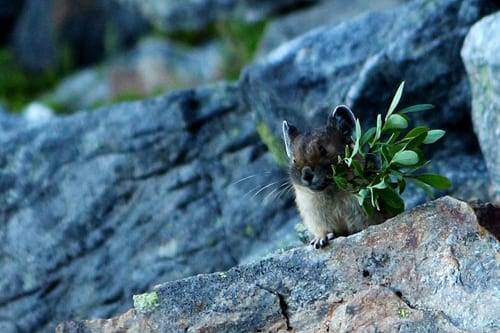
City Light’s Skagit River Hydroelectric Project Wildlife Research Program is producing new information on a species in the North Cascades: the American Pika. The American Pika (pictured above), a diurnal species closely related to rabbits, is found in the mountains of western North America and lives in the boulder fields and talus near the Skagit River Hydroelectric Project. Pikas eat grasses and herbs that grow along the edges of these rocky areas and cut and stockpile plant material in rock crevices by “haying” during the summer and then eat it during winter. They are arguably one of the cutest (if not the cutest) mammals in Washington. If you are ever hiking near talus slopes, listen for their distinctive “Eeeep” alarm call. They also use snow to protect themselves from cold.
Wildlife researchers have focused much recent attention on this species because they are sensitive to climate change effects on temperature and winter precipitation patterns—unlike other species of wildlife that adapt to warming by moving northward or to higher elevations, pikas have minimal options. A recent research project funded by the Skagit River Hydroelectric Project Wildlife Research Program is helping shed more light on how this species is being affected by climate change. Researchers with the U.S. Geologic Survey and the National Park Service just had their research entitled “Snow Drought and Pikas: Ecological Consequences of Anomalies in Atmospheric Moisture and Snowpack” accepted for publication in the prestigious scientific journal “Ecology.” Their study looked at more than eight years of data collected in the North Cascades. The study found that extreme events such as snow drought resulting from climate change have effects and that the pika population response to snowpack drought varied among different elevation bands. Pikas were affected by cold stress without snowpack at mid-elevations, whereas a change to their food was influential at high and low elevations.
The WRP is an element of City Light’s federal license for operating the Skagit River Project that calls on the utility to collaborate with resource and land management agencies to select and fund original wildlife research projects in the North Cascades to improve the information available for future management. Since 1999, City Light has awarded 54 different grants, totaling more than $2 million.
In addition to several Pika research projects, the Wildlife Research Program has funded research on elk, deer, mountain goats, bears, cougars, Canada lynx, wolverines, wolves, terrestrial and aquatic insects, salamanders, frogs and cottonwood ecology. The program is a prime example of how City Light strives to be a good steward of the natural resources that our electricity generation effects.
